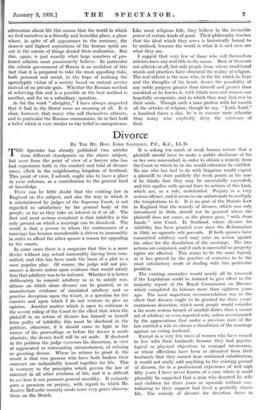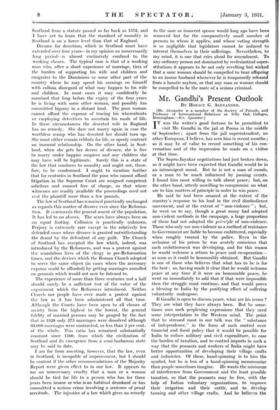Divorce
By Tun RT. HON. LORD SALVESEN, P.C., K.C., LL.D.
THE Spectator has already published two articles from different standpoints on the above subject, but none from the point of view of a lawyer who has had experience both in the conduct and trial of divorce eases, albeit in the neighbouring kingdom of Scotland. This point of view, I submit, ought also to have a place in your columns, as a contribution to the general fund of knowledge.
There can be little doubt that the existing law in England on the subject, and also the way in which it is administered by judges of the Supreme Court,, is not regarded as satisfactory by the general body of the people, so far as they take an interest in it at all. The first and most serious complaint is that infidelity is the only ground on which a marriage can be dissolved. The result is that a person to whom the continuance of a marriage has become unendurable is driven to immorality in order to afford the other spouse a reason for appealing to the courts.
In some cases there is a suspicion that this is a mere device without any actual immorality having been com- mitted, and this has been made the basis of a plot in a once popular play. Of course, the judge will not pro- nounce a decree unless upon evidence that would satisfy him that adultery was to be inferred. Whether it is better deliberately to commit adultery so as to satisfy con- ditions on which alone divorce can be granted, or to manufacture evidence of simulated adultery and so practise deception upon the Court, is a question for the casuists and upon which I do not venture to give an opinion. Another matter which is open to criticism is the recent ruling of the Court to the effect that when the plaintiff in an action of divorce has himself or herself been guilty of infidelity this must be disclosed in the petition, otherwise, if it should come to light in the course of the proceedings or before the decree is made absolute, the decree itself will be set aside. If disclosed in the petition the judge exercises his discretion, in view of aggravated or extenuating circumstances, of refusing or granting decree. Where he refuses to grant it, the result is that two persons who have both broken their contract are indissolubly bound together for life. This is contrary to the principles which govern the law of contract in all other relations of life, and it is difficult to see how it can promote general morality. It certainly puts a premium on perjury, with regard to which Mr. Justice MeCardie recently made some very grave observa- tions on the Bench. It is asking too much .of weak human nature that a plaintiff should have to make a public disclosure of his or her own misconduct in order. to obtain a remedy from the Court to which he or she would otherwise be entitled. No one who has had to do with litigation would expect a plaintiff to state publicly the weak points in his case if he thinks that they may be successfully concealed, and this applies with special force to actions of this kind, which are, as a rule, undefended. Perjury is a very serious offence, and it seems to me unfortunate to multiply the temptations to it. It is no part of the Statute Law in England that the remedy of divorce, which was only introduced in 1858, should not be granted where the plaintiff does not come, as the phrase goes, " with clean hands " into Court. In Scotland, where divorce for infidelity has been granted ever since the Reformation in 1560, an opposite rule prevails. If both spouses have committed adultery each may raise an action against the other for the dissolution of the marriage. The two actions are conjoined, and if each is successful no property rights are affected. This seems to be the more logical, as it has proved by the practice of centuries to be the most satisfactory mode of dealing with this particular problem.
The existing anomalies would nearly all be removed if the Legislature could be induced to give effect to the majority report of the Royal Commission on Divorce which completed its labours more than eighteen years ago. The most important recommendation was to the effect that divorce ought to be granted for three years' continuous desertion, which most people would consider a far more serious breach of marital duties than a casual act. of adultery or even repeated acts, unless accompanied by the aggravations that under a previous state of the law entitled a wife to obtain a dissolution of the marriage against an erring husband.
Except in a very few eases of women who have ceased to live with their husbands because they had psycho- logical or physical objections to conjugal intercourse, or whose affections have been so alienated from their husbands that they cannot bear continued cohabitation, it would not really add anything to the existing ground of divorce, for in a professional experience of well nigh fifty years I have never known of a case where it could plausibly be suggested that a man who deserted his wife and children for three years or upwards without con- tributing to their support had lived a perfectly chaste life. The remedy of divorce for desertion dates in Scotland from a statute passed so far back as 1578, and I have yet to learn that the standard of morality in Scotland is on a lower level than that of England.
Divorce for desertion, which in Scotland must have extended over four years—in my opinion an unnecessarily long period—is almost exclusively • confined to the working classes. The typical case is that of a working man who, after a short experience of marriage, tires of the burden of supporting his wife and children and emigrates to the Dominions or some other part of the country where he may spend his earnings on himself with callous disregard of what may happen to his wife and children. In most cases it may confidently be surmised that long before the expiry of the four years he is living with some other woman, and possibly has committed bigamy in a distant land. The poor woman cannot afford the expense of tracing his whereabouts or Employing detectives to ascertain his mode of life. In these circumstances the deserted wife in England has no remedy. She dare not marry again in case the worthless scamp who has deserted her should turn up. She must either remain celibate for life, or openly contract an immoral relationship. On the other hand, in Scot- land, when she gets her decree of divorce, she is free to marry under happier auspices and any children she may have will be legitimate. Surely this is a state of the law that conduces to morality and ought not, there- fore, to be condemned. I ought to mention further that for centuries in Scotland the poor who cannot afford litigation in the Supreme Court are assigned competent solicitors and counsel free of charge, so that where witnesses are readily available the proceedings need not cost the plaintiff more than a few pounds.
The law of Scotland has remained- practically unchanged as regards this matter of divorce ever since the Reforma- tion. It commands the general assent of the population. It has led to no abuses. The sexes have always been on an equal footing. Collusion is practically unknown. Perjury is extremely rare except in the relatively few defended cases where divorce is granted notwithstanding the denial by the defendant of any guilt. The Church of Scotland has accepted the law which, indeed, was introduced by the Reformers, and was a protest against the scandalous lives of the clergy in pre-Reformation times, and the devices which the Roman Church adopted to serve the same object (in cases where the necessary expense could be afforded) by getting marriages annulled on grounds which would not now be listened to.
The experience of more than three centuries and a half should surely be a sufficient test of the value of the experiment which the Reformers introduced. Neither Church nor people have ever made a protest against the law as it has been administered all that time. Although the Courts have been open to all classes of society from the highest to the lowest, the general fidelity of married persons may be gauged by the fact that in 1928 only 575 marriages were dissolved although 33,000 marriages were contracted, or less than 2 per cent. of the whole. This ratio has remained substantially constant since 1560, from which the civilization of Scotland and its emergence from a semi-barbarous state may be said to date.
I am far from asserting, however, that the law, even in Scotland, is incapable of improvement, but I should be content if the other recommendations of the Majority Report were given effect to in our law. It appears to me an unnecessary cruelty that a man or a woman should be tied for life to a person who has for three years been insane or who is an habitual drunkard or has committed a serious crime involving a sentence of penal servitude. The injustice of a law which gives no remedy to the sane or innocent spouse would long ago have been removed but for the comparatively small number of persons to whom it applies, and whose voting strength is so negligible that legislators cannot be induced to interest themselves in their sufferings. Nevertheless, to my mind, it is one that cries aloud for amendment. To any ordinary person not dominated by ecclesiastical super;. stitutions it appears to be not only revolting but wicked that a sane woman should be compelled to bear offspring to an insane husband whenever he is temporarily released from a lunatic asylum, or that any man or woman should be compelled to be the mate of a serious criminal..







































 Previous page
Previous page